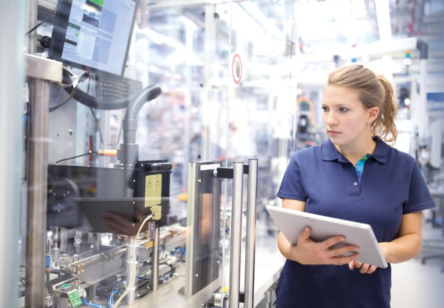Crises reveal weaknesses. The coronavirus pandemic has highlighted the value of connected manufacturing and logistics. The internet of things (IoT) helps manufacturing companies react more flexibly than before to disruptions, since the utilization and condition of each individual machine can be tracked in real time, and there is transparency along the supply chain. “Especially in exceptional times such as the current crisis, connectivity makes companies less vulnerable and helps them keep an even keel,” says Rolf Najork, the member of the Bosch board of management responsible for industrial technology. For example, where the risk of infection makes physical proximity a challenge, shift handovers can be handled digitally. Digitalization enables remote monitoring and maintenance of systems and machines, with no need for a technician on site. Intelligent software can track goods and deliveries, and ensure replenishment, from any location. All this is possible thanks to Industry 4.0. Connected solutions will help make manufacturing and logistics simpler, more efficient, more flexible – and also more robust. Bosch is an IoT pioneer. The company began adding connectivity to manufacturing and logistics in 2012 – both in its own plants and in those of its customers. And this is paying off: In 2019, Bosch generated sales of more than 750 million euros with connected solutions for manufacturing and logistics – an increase of 25 percent over the previous year.
Industry 4.0 boosts factory productivity
In the factory of the future, the only things that are static and fixed are the floors, walls, and ceilings. The factory of the future constantly reinvents itself as needed. It is guided by a vision of a manufacturing set-up that can produce thousands of different products and variants, down to a batch size of one, without the need for expensive retrofitting. This is why Bosch is committed to connectivity. Projects in this area drive progress and deliver measurable benefit. With the help of Industry 4.0, it is possible to increase productivity at individual locations by up to 25 percent. “Connectivity is essential for any company that wants to stay competitive. Industry 4.0 is a historic opportunity, offering enormous potential,” Najork says. “We are not only improving factory productivity, but also enabling companies to respond quickly and appropriately to changes.” To take the example of Bosch, the transition of the automotive industry means pressure on costs for its powertrain division, as well as pressure to adapt. For precisely this reason, the division will be investing some 500 million euros in comprehensively digitalizing and adding connectivity to its manufacturing operations over the next few years. The expected saving will be twice as high: roughly 1 billion euros by 2025. And the use of artificial intelligence is expected to add even more of a boost. The focus here is on AI-based solutions for predictive maintenance of machinery, for quality assurance, and for improving production processes. For example, AI is used in highly complex wafer fabs – such as the Bosch plant in Reutlingen – for detailed production scheduling, saving time and costs as it guides the wafers through more than 500 processing steps. This alone means a 5 percent faster wafer throughput, with an investment payback time of just three months.










